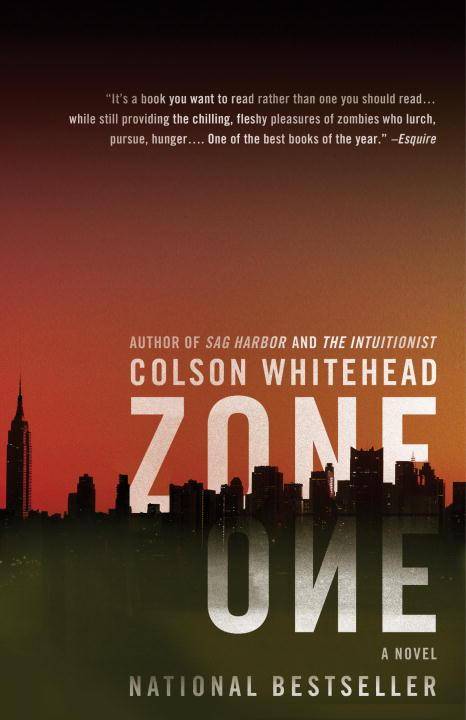
 Zone One: A Novel by Colson Whitehead
Zone One: A Novel by Colson Whitehead
C'mon now, trust me. I know this is a blog primarily about crime fiction, but don't forget, tonight is Halloween, and I've got just the ticket. It's literary fiction set in a post-apocalyptic Manhattan after a pandemic Last Night devastated the world. The dead are people who were killed outright or turned into vehicles of the plague.
Zombies!
Buffalo, New York, is the cradle of reconstruction. The goal of the provisional government there is to clear New York City of the undead, zone by zone, and then move on to other cities. In addition to running this military campaign, the government aims to boost the morale of survivors, "all fucked up in their own way; as before, it was a mark of one's individuality." Psychotherapist Dr. Neil Herkimer coined the buzzword PASD (post-apocalypse stress disorder) and put it at seventy-five percent of the surviving population; the rest have a preexisting mental condition, so one hundred percent of the world is mad. In addition to shipping out "Living with PASD" pamphlets, the government conducts an "American Phoenix Rising" propaganda campaign, complete with sponsors and the anthem "Stop! Can You Hear the Eagle Roar? (Theme from Reconstruction)."
So much for the survivors. Skels (short for "skeletons" or zombies) come in two types: the rabid flesh-eating predators and the much-slowed and pathetic stragglers, who are trapped in their former abodes. After Marines deal with the rabid skels, crews of civilian volunteers, directed by military officers stationed at "Fort Wonton" in Chinatown, sweep out the stragglers. Currently, Zone One (a region created by barriers south of Canal Street) has been cleared by Marines, and the sweepers are moving through it. We follow one such sweeper, a former Starbucks employee nicknamed Mark Spitz (the full name is always used), whose defining trait is his mediocrity:
His most appropriate designation [in high school] would have been Most Likely Not to Be Named the Most Likely Anything, and this was not a category. His aptitude lay in the well-executed muddle, never shining, never flunking, but gathering himself for what it took to progress past life’s next random obstacle.Mark Spitz and his fellow sweepers, "seemingly unsnuffable human cockroaches," are protected by not-overly-great weapons and protective clothing and good luck, and they operate in war-like conditions. They swap stories of past lives and use black humor as they dispatch the undead. Occasionally, someone looks like someone Mark Spitz had known or loved. He doesn't consider himself a mere exterminator, but rather an angel of death ushering stragglers on their stalled journey. Of course, not all of the undead Mark Spitz encounters are stragglers; his bad habit of flashing back to happier pre-Last Night times while struggling with skels trying to rip off his flesh nearly levitated me from the bed in anxiety. And the infested subway tunnel would have made a George A. Romero fan happy.
Zone One, published in 2011 by Doubleday, has enough gore to keep a horror fan fairly satisfied, but the wit, imagery, references to pop culture, and wordplay will please everyone. It's surprisingly funny and tender:
Mark Spitz had seen the park unscroll from the windows of the big skyscrapers crowding the perimeter, but never from this vantage. No picnickers idled on their blankets, no one goldbricked on the benches and nary a Frisbee arced through the sky, but the park was at first-spring-day capacity. They didn’t stop to appreciate the scenery, these dead visitors; they ranged on the grass and walkways without purpose or sense, moving first this way then strolling in another direction until, distracted by nothing in particular, they readjusted their idiot course. It was Mark Spitz’s first glimpse of Manhattan since the coming of the plague, and he thought to himself, My God, it’s been taken over by tourists.
 |
| Author Colson Whitehead |
No comments:
Post a Comment